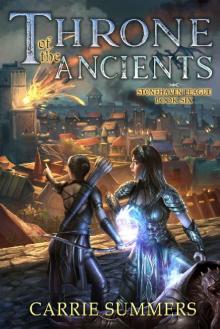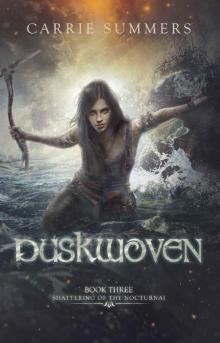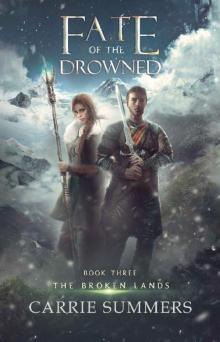- Home
- Carrie Summers
Fate of the Drowned (The Broken Lands Book 3)
Fate of the Drowned (The Broken Lands Book 3) Read online
Table of Contents
Prologue
Chapter One
Chapter Two
Chapter Three
Chapter Four
Chapter Five
Chapter Six
Chapter Seven
Chapter Eight
Chapter Nine
Chapter Ten
Chapter Eleven
Chapter Twelve
Chapter Thirteen
Chapter Fourteen
Chapter Fifteen
Chapter Sixteen
Chapter Seventeen
Chapter Eighteen
Chapter Nineteen
Chapter Twenty
Chapter Twenty-One
Chapter Twenty-Two
Chapter Twenty-Three
Chapter Twenty-Four
Chapter Twenty-Five
Chapter Twenty-Six
Chapter Twenty-Seven
Chapter Twenty-Eight
Chapter Twenty-Nine
Chapter Thirty
Chapter Thirty-One
Chapter Thirty-Two
Chapter Thirty-Three
Chapter Thirty-Four
Chapter Thirty-Five
Chapter Thirty-Six
Chapter Thirty-Seven
Chapter Thirty-Eight
Chapter Thirty-Nine
Chapter Forty
Chapter Forty-One
Chapter Forty-Two
Chapter Forty-Three
Chapter Forty-Four
Epilogue
Table of Contents
Prologue
Chapter One
Chapter Two
Chapter Three
Chapter Four
Chapter Five
Chapter Six
Chapter Seven
Chapter Eight
Chapter Nine
Chapter Ten
Chapter Eleven
Chapter Twelve
Chapter Thirteen
Chapter Fourteen
Chapter Fifteen
Chapter Sixteen
Chapter Seventeen
Chapter Eighteen
Chapter Nineteen
Chapter Twenty
Chapter Twenty-One
Chapter Twenty-Two
Chapter Twenty-Three
Chapter Twenty-Four
Chapter Twenty-Five
Chapter Twenty-Six
Chapter Twenty-Seven
Chapter Twenty-Eight
Chapter Twenty-Nine
Chapter Thirty
Chapter Thirty-One
Chapter Thirty-Two
Chapter Thirty-Three
Chapter Thirty-Four
Chapter Thirty-Five
Chapter Thirty-Six
Chapter Thirty-Seven
Chapter Thirty-Eight
Chapter Thirty-Nine
Chapter Forty
Chapter Forty-One
Chapter Forty-Two
Chapter Forty-Three
Chapter Forty-Four
Epilogue
Fate of the Drowned
Book Three
The Broken Lands
Carrie Summers
Prologue
Avill
Wildsends
Six weeks before the fall of Steelhold
THE ONLY WARMTH in the world came from the shallow bone bowl cradled in Avill’s hands. She held the soup close and breathed the steam so the broth would warm her lungs as well as her belly. Before her, a low fire nibbled at a square of sun-dried moss. The sun had risen, its rays spilling like weak tea over the tundra. But neither fire nor sun could blunt the chill that soaked through her body. Not even her shaggy fur robe could keep out the cold.
Only Sheshik’s fish soup, oily and lichen-spiced, warmed her enough to keep her alive.
Shivering, she took another sip and watched the low flames inside their circle of stones. The smoke smelled of earth and roots, so different from the driftwood fires Avill’s mother had kindled in their small home in Numintown. Of course, back home Avill wouldn’t have been eating breakfast outside. She wouldn’t have slept in a hide-covered tent. And she wouldn’t have to wonder if she’d ever see her family again.
Tears budded, stinging in the cold. Avill clenched her jaw and blinked them away. It was no use feeling sorry for herself. She was alive. The Free Tribes had taken her in, a helpless twelve-year-old girl, despite the circumstances of her arrival. And she wouldn’t be here forever. Someday, once she mastered the magic in her mother’s pendant, she’d find her way home.
Another shiver built in her spine, and Avill sipped from the bowl to banish it. She squinted in the morning light, looking beyond the small encampment to the expanse of tundra beyond. Yesterday, it had snowed. Much of what had fallen had melted already, but still, little patches of white hid in the northern aspects of hummocks and rocks. According to Sheshik, some traces would remain, clinging to the land until the long years of Chilltide and Deepwinter had passed.
The coming of the cold didn’t seem to bother the people of the Free Tribes. Even now, Sheshik stalked about the camp wearing a fur-lined vest that left her arms bare. Around the large woman’s neck, a necklace strung with seedpods and sharks’ teeth rattled. She stalked from hide-covered shelter to hide-covered shelter, clanging one of her precious steel spoons against an earthen bowl.
“Up!” she called.
Avill glanced toward the horizon and the distant circle of the just-risen sun. Ordinarily, the encampment woke at its own pace. Maybe there’d be a hunt today.
Groaning, the other tribespeople of Sheshik’s band emerged from their domed shelters. Like their leader, they wore clothing that bared large swaths of flesh despite the frosty air. Chilled by the sight, Avill pulled her elbows close and tugged the hood of her robe over her hair. Nearby, Doleshil, a middle-aged man with tattoos of sea creatures on his forearms, glanced at her and smirked. He’d taken to calling her their little southern teacher. Abandoned here by the slavers to remind the Tribes of the dangers of getting soft.
As she watched a half-naked child tumble—on purpose—through a patch of fresh snow, Avill doubted the Free Tribes had any reason to fear that.
Once the tribe members were up and moving, Sheshik returned to the cookpot in the center of the encampment and stirred the morning soup. As a fresh curl of steam reached her nose, Avill sipped again from her bowl. She held the mouthful on her tongue before swallowing. Once the others had eaten, she’d probably get a second helping, but until then she wanted to savor the heavy warmth in her mouth and belly.
“Why did you rouse us so early?” one of the men asked, measuring the sun’s distance off the horizon with a pair of fingers.
Sheshik crossed her arms over her chest. On her wrists, she wore rabbit-fur cuffs decorated with shells and bits of iron. Metal of any type was rare in the Wildsends. By wearing the iron pieces openly, Sheshik marked her status not just within this band, but within the larger coalition of Tribes. From what Avill had gathered, the headwoman sat on the Free Council itself.
“Is it early?” Sheshik asked, glancing at the sun. “Or have you gotten lazy?”
She winked then sucked her teeth and turned her attention toward the northern coast. Yesterday morning, before the snowstorm had swirled in from the west, Avill had accompanied the woman on a half-hour walk to the beach to gather kelp for the daily soup. Though the sea hadn’t yet frozen, a thick band of ice had crusted the cobbles where wavelets lapped at the rocky shore. Beyond, icebergs drifted ponderously on the currents. According to Sheshik, there’d rarely been so many. As the earthquakes had worsened in recent months, the glacier
s that descended from the Icethorns had calved ever more frequently. This concerned Sheshik—it was clear in the tone of her voice. But when Avill had asked, the tribeswoman had changed the subject.
After a moment, Sheshik looked toward Doleshil who cleared his throat. “Sheshik saw the first ice terns flying southeast yesterday,” he said. “The caribou will be moving. It’s time for most of us to break camp and head for the gathering.”
The man who’d asked the initial question cocked his head as if confused. “Most of us?”
“I must remain for a while longer,” Sheshik said. She turned her attention back to the soup, continuing to stir as if the conversation were entirely ordinary. The corded tension in her bare arms said otherwise.
A woman who had been fussing with her young daughter’s coat shooed the child away. “I don’t understand, Yeviltish,” she said, using the honorary term for a tribe’s leader. “Why would you stay behind? What will the other Tribes think if we arrive at the gathering without you?”
Avill looked back and forth between the women. If the band was leaving Sheshik behind, what would happen to Avill? Since her arrival, she’d slept in the headwoman’s tent. Though she helped with a few chores, she largely existed on Sheshik’s charity. Would another tribe member take responsibility for her?
“I don’t plan for you to join the gathering without me—with good fortune, I hope to catch you before you even reach the Frenglesh Plain. But if my task proves more difficult than I expect, Doleshil has instructions. For the next weeks, you shall consider him your leader. Treat his commands as if they were my own.”
A chorus of protests rose from the tribespeople as shock replaced the haze of sleep. Avill wondered if Sheshik had chosen an early morning for her declaration in hopes of catching people unawares.
“Of what task do you speak?” the mother asked. Avill had seen her in deep conversation with Sheshik many times. The woman held a lot of respect amongst her fellow tribespeople. “What could be so important that you’d journey alone with Chilltide approaching? We nearly lost people to the snow cats last migration, and that was with every hunter fighting their attack.”
“My duty relates to our guest,” Sheshik said, glancing casually at Avill who stiffened as if jabbed with a dagger. “It is a task passed down to our people from the First Tribe. My father gave it to me, and he received it from his uncle who was headman before him. Doleshil can explain as you travel—I’ve told him everything so that he can report to the Free Council if I do not arrive in time.”
In the hush that fell over the camp, the loudest sounds were the bubbling of the soup and the thudding of Avill’s heart. Sheshik had given her no warning of this. Avill set down her soup bowl and hugged her arms tighter as if she could hide from the stares of the tribespeople. She didn’t want to cause trouble and certainly didn’t want to put Sheshik in danger.
“Well?” Doleshil said. “I believe you all heard the plan. Will it be afternoon before we can begin walking?”
The pause that followed seemed full of unvoiced arguments. Would the band accept Sheshik’s decision? Did the woman’s explanation of her task mean that Avill would be staying behind as well? If she journeyed south with Sheshik, the trek would be even more dangerous. Avill was small, constantly cold, and she certainly couldn’t help fend off a snow cat attack. If the predators set on them, Avill could use her mother’s pendant to escape on the wind. But that would mean abandoning Sheshik, leaving the headwoman at the snow cats’ mercy just like she’d left her mother in the clutches of the henchmen who’d kidnapped them.
No, she told herself. Don’t think of that. Besides, maybe Mother got away in the chaos.
Finally, a tribesman grunted in obvious displeasure but ladled a helping of soup into a whalebone bowl. He swallowed the meal in three long drinks, returned the bowl to a pile beside the cookfire, then headed into his tent. A rucksack frame emerged from the shelter followed by a fur bedroll.
As if his decision loosed a landslide of assent, the rest of the band set to work eating and preparing to break camp. In the bustle that followed, Sheshik nodded toward Avill and gestured toward their shared tent.
***
Whale-oil lamps cast flickering light over the inside of Sheshik’s shelter. Avill’s bedroll lay against one edge of the tent, a knee-deep collection of thick furs that kept away most of the night’s chill. Sheshik slept on a simple willow-wood frame covered with stretched leather. Just two large snowbear skins kept the headwoman warm each night. A hide-bound trunk crouched at the end of Sheshik’s bed. Avill had never seen the woman open it and had sometimes wondered what it contained. Nothing ordinary, it seemed; the possessions Sheshik commonly used were neatly stacked around the edges of the shelter. The most prized of them, an easel set with a stretched piece of supple leather, stood between their sleeping spots. Beside it, Sheshik kept a collection of brushes and a pot of squid ink. In rare moments of idleness, the woman painted beautiful renderings of the landscape. Avill had considered the tundra bleak until she saw it through Sheshik’s eyes.
“You have questions, I’m sure,” Sheshik said as she ducked into the shelter. “But please allow me to speak first. I apologize for not warning you. It was my own weakness… I don’t wish to place such a heavy burden on such a young girl, and I fought this choice for many days. Last night, I confided my plan to Doleshil, but even then, I hadn’t made up my mind. My final decision came with the dawn.”
“What burden, Sheshik? What is this about?” Avill hunched her shoulders as she edged around to her bedroll. Although she owned nothing but the clothing she wore beneath her donated furs and the stone pendant resting against her breastbone, her sleeping spot felt like a safe retreat.
“It’s a long tale that will take many days,” Sheshik said.
“That means I’m staying with you?”
The headwoman nodded. “For a time.” She sighed as she stepped to her cot and sat. “There’s another thing I’d like to speak about before I explain my greater task. I’ve known about your pendant since you arrived.”
Avill’s breath froze in her lungs. She fought the urge to lay a hand over the Wind’s Gift where it hid beneath her many layers of clothing.
Sheshik chuckled. “I know much more of magic than you think, my southern friend. Far more than I’d like, in truth. I don’t know how you came by such a totem, but I’ve had to work hard to keep the others from noticing when you slip into the tent to practice with it.”
“How did you know?”
“Your story about the slave traders’ abandonment might have held up if I hadn’t been nearby collecting lichen scrapings when you arrived.”
“You were there? But I didn’t see you.”
Sheshik smirked. “Do you think I am fool enough to watch a girl appear out of a funnel of wind and not think to hide? I nearly dropped you with a rock from my sling but thought better of it when you started staggering for the camp, already blue with cold. You didn’t look like much of a threat. But I was concerned enough to give you space in my own tent and to sleep with a knife close at hand for the first few nights.”
“But the others don’t know, right?” Avill cringed, thinking of the weeks she’d been with the band. Her cheeks heated with embarrassment at the idea that they might have just pretended to accept her story about the salvers.
Sheshik shook her head. “They will once Doleshil explains. But I’ve let you keep your secret while I considered what to do. As I said, your slaver story was believable. We’ve had increasing trouble with their caravans crossing the Wildsends to reach the land bridge to Eastern Farvens. The edge of Chilltide is an unlikely time for the journey, but it’s not unheard of.”
Slowly, Avill pulled the Wind’s Gift from beneath her tunic. The greenish-white stone of the pendant was warm in her hand. She traced the designs on its surface while listening to the bangs and rustles and grunts beyond the tent wall. The tribe members spoke little, either due to their dismay over the s
ituation, or maybe because the task of breaking camp took all their attention. “My mother kept the pendant secret from me until men captured us and took us away from home. She was much better with it. She could even control where the wind carried her.”
“Why did the men take you?”
“We never found out for certain. It was the day my sister, Savra, was supposed to receive her Function assignment from the Empire. I ran to get Mother so she could be there to see Savra get her writ, but when I got back, buildings were burning. The men grabbed us.” Avill swallowed around a suddenly thick tongue. She’d never had a chance to tell Savra goodbye.
“And they never spoke of a reason?”
“They were working for someone else. Havialo, I think his name was. But no, they never gave a reason.”
Sheshik sighed. “The Empire is a cruel place. Sometimes I wonder if the First Tribe made the right choice to hide away in the Wildsends. In any case, your mother knew the pendant was magic?”
Avill nodded. “It’s been passed through her family for generations. She said it washed ashore from the Maelstrom long ago.”
Sheshik’s brow furrowed. “All the more reason to heed the signs. Listen, Avill, it’s difficult to know where to begin explaining. I never expected to carry out this duty. Until recently, I wondered if the tales were even true. But the flood rises again—I’m sure of it. The continent will drown in its darkness. And I believe the wind has brought you to me for this reason. Our peoples have diverged too far. The Free Tribes have no sway in the Empire now, even if we could survive the southern climes.”
“Survive? If you can live here, I would think you could live anywhere.”
Sheshik snorted. “You think blood as thick as mine would tolerate the Highsummer sun?” She shook her head. “We’ve tried to send many emissaries over the last years. Perhaps twenty groups since the first signs of the flood’s reappearance. The representatives sicken as if by fever, getting weaker day by day. And if that’s not enough, the Empire won’t accept a pennant of truce. The soldiers treat our delegations like war parties.”
Despite the enclosing shelter of the tent, Avill shivered. She settled into the deep nest of furs and pulled them close. Like the hides that covered the shelter, the blankets smelled like a combination of animals, the acrid tannins used to cure the leather, and the accumulation of years of smoke from the moss fires.

 Throne of the Ancients: A LitRPG Adventure (Stonehaven League Book 6)
Throne of the Ancients: A LitRPG Adventure (Stonehaven League Book 6) Mistress of Thieves (Chronicles of a Cutpurse Book 1)
Mistress of Thieves (Chronicles of a Cutpurse Book 1) Shattering of the Nocturnai Box Set
Shattering of the Nocturnai Box Set Empress of Rogues
Empress of Rogues Silent Queen
Silent Queen Vault of the Magi: A LitRPG Adventure (Stonehaven League Book 5)
Vault of the Magi: A LitRPG Adventure (Stonehaven League Book 5) Heart of the Empire (The Broken Lands Book 1)
Heart of the Empire (The Broken Lands Book 1) Ruler of Scoundrels (Chronicles of a Cutpurse Book 2)
Ruler of Scoundrels (Chronicles of a Cutpurse Book 2) Duskwoven
Duskwoven Nightforged (Shattering of the Nocturnai Book 1)
Nightforged (Shattering of the Nocturnai Book 1) Citadel of Smoke: A LitRPG and GameLit Adventure (Stonehaven League Book 4)
Citadel of Smoke: A LitRPG and GameLit Adventure (Stonehaven League Book 4) Temple of Sorrow: A LitRPG and GameLit Adventure (Stonehaven League Book 1)
Temple of Sorrow: A LitRPG and GameLit Adventure (Stonehaven League Book 1) Darkborn (Shattering of the Nocturnai Book 4)
Darkborn (Shattering of the Nocturnai Book 4) Fate of the Drowned (The Broken Lands Book 3)
Fate of the Drowned (The Broken Lands Book 3) Rise of the Storm
Rise of the Storm Ruler of Scoundrels
Ruler of Scoundrels Shadowbound
Shadowbound